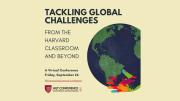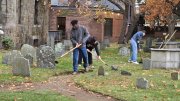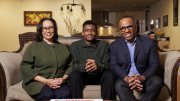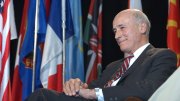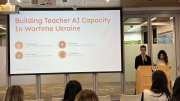“Worrying seems about as necessary as breathing these days,” President Lawrence J. Bacow remarked last Friday in his address at the tenth annual Harvard Initiative for Learning and Teaching (HILT) conference. “Global challenges abound, and efforts to address them will have to be based in deep considerations of equity and justice, of community and humanity. How do we prepare our students to undertake that work? How can we do a better job as teachers, as scholars, as leaders, of putting our own work in as broad a context as possible?”
These questions opened the conference, this year titled “Tackling Global Challenges from the Harvard Classroom and Beyond” and attended by more than 300 Harvard faculty members and academic leaders. The conference is designed to create a University-wide dialogue about teaching and learning innovation among Harvard’s professors, senior leaders, academic professionals, and students. (Read about the 2020 conference here.)
This year’s event—again conducted virtually via Zoom—encouraged Harvard educators to reflect on their experience teaching remotely during a pandemic that “exacerbated issues” like social and healthcare inequality “that have existed in society for many, many years,” said panelist and senior lecturer in molecular and cellular biology Alain Viel. Undergraduate courses have returned to in-person instruction, but “We can’t ignore what happened during the last 17 months,” said Bharat N. Anand, vice provost for advances in learning. Those 17 months—marked by the pandemic, remote teaching, protests against systemic racism and police brutality, and economic hardship for millions of people—made it clear to educators that their students will enter a changed world after graduation.
Graduate School of Education (HGSE) dean Bridget Terry Long noted that as students spread around the world into a wide variety of communities, Harvard was no longer “far removed in Cambridge in the ivory tower.” With both the state of the world and the global reach of remote teaching in mind, the conference posed one central question: “How can we best prepare students to address global challenges in thoughtful and creative ways?”
What Harvard Learned
The main morning panel discussion featured a presentation by members of the Harvard Future of Teaching and Learning Task Force, including Finley professor of engineering and applied sciences Michael D. Smith, Long, and Anand (under whose auspices the task force was organized). For the past seven months, the task force has studied Harvard’s approach to remote learning, gathering feedback from faculty and students. In a report that will be issued in a few weeks, they propose ways Harvard can use the remote-learning innovations developed by faculty members during the pandemic to enrich the University’s residential community and broaden its global remote-education offerings.
The panelists identified three advantages to online teaching: the ability to “collapse time,” bridge “space and geography,” and provide “personalization” for students. Remote learning, Anand said, can collapse time through “simultaneous learning”: for instance, students can send questions to teaching fellows in the Zoom chat room during a lecture. Online instruction is also an opportunity “for us to welcome in voices that normally aren’t present at Harvard,” Long said, by including students from rural communities and places other than the east and west coasts. And students could “personalize” their learning experience by watching asynchronous recordings at a time that was convenient for their schedule, for instance.
The task force’s most powerful finding, Anand said, was that 86 percent of the Harvard faculty agreed they would like to bring back some aspect of remote teaching to the in-person classroom. “That’s stunning,” Anand said. “This is not hyperbole—I think we’re at the beginning of a transformation.”
Some of that potential transformation, Long said, may involve rethinking residential life. “It’s not that campus doesn’t matter. Campus still matters. But what I think we are starting to dream about, in much more creative ways as we think about the long term, is that…it doesn’t have to be one size fits all.” For instance, when revamping its master’s program this year, HGSE decided to continue some courses online even after remote-learning restrictions were lifted. One of the master’s program foundational courses, “How People Learn,” is now taught fully remotely during June and July as a way to introduce students to “all that digital learning has to offer,” such as multimedia experiences and individualized content.
Since not everyone can relocate to Cambridge for a degree, Anand added, “We can relook at policies around the residency requirement to try and perhaps be a little more innovative with respect to things like hybrid degrees.” He also suggested that Harvard’s non-degree online learning programs, such as edX, can expand through “last mile” partnerships with local organizations. Students are best mentored and assessed by teachers in their community, so Anand suggested that edX can “partner with those organizations to try and marry online content creation with distribution to meet learners where they are.”
Paths Forward
Following the morning panel, four breakout discussions covered practical ways educators can prepare students for a complex, diverse world. In “Interdisciplinary Approaches to Addressing Real-World Problems,” instructors of multidisciplinary courses explained how they’ve given students a real-world experience in the classroom. The University should facilitate more student collaboration, associate professor of medicine Salmaan Keshavjee said. “We should be encouraging students to help each other with problem sets and assignments, and take away this whole element that you’re working on your own to do something,” he said. “I actually think every class at Harvard should be like that.”
Another breakout session was “Incorporating Cultural Humility: Cultivating Context and Respect,” in which associate director of the program on law and society in the Muslim world Salma Waheedi shared how she increased students’ empathy and cultural awareness in simulations in her law clinic by asking them to role-play positions that they normally wouldn’t inhabit—such as the role of a victim. Yet another panel highlighted the power of experiential learning, focusing on ways professors have taken students outside the classroom and into the real world to deepen learning. For instance, lecturer on sociology Flavia Peréa encouraged a group of students to sit in on an affordable-housing lottery meeting as part of their capstone project research, telling them it was not something they could learn about from a textbook.
Throughout the HILT conference, attendees grappled with how the University prepare students for a changing world. For President Bacow, the obligation of the University’s future should be rooted in the Jewish concept of tikkun olam, or “the obligation of each of us to repair this imperfect world.” “It is beautiful in its simplicity, as it is radical in its charge,” he said. “Every day, I think we can ask ourselves if what we are doing in every dimension of our lives is moving humanity toward a better future. Every day, we can choose to do more, and recognize that every good thing coming out of Harvard is the result of a choice to do good, a choice to focus attention and effort where it is most needed.”
